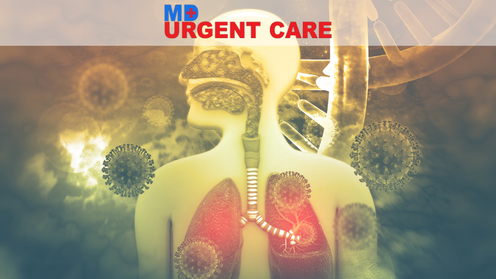An upper respiratory infection affects the upper part of your respiratory system, including your sinuses and throat.
A respiratory tract infection affects the respiratory system, the part of your body responsible for breathing. These infections can affect your sinuses, throat, lungs, or airways. There are two types of respiratory infections:
Upper respiratory infections.
Lower respiratory infections.
What is an upper respiratory infection?
These infections affect your sinuses and throat. Upper respiratory infections include:
- Common cold.
- Epiglottitis.
- Laryngitis.
- Pharyngitis (sore throat).
- Sinusitis (sinus infection).
What is a lower respiratory infection?
A lower respiratory infection affects the airways and lungs. In general, lower respiratory infections last longer and are more serious. These infections include:
- Bronchitis is a lung infection that causes coughing and fever.
- Bronchiolitis is a lung infection that mainly affects young children.
- Chest infection.
- Pneumonia.
What causes upper respiratory infections?
You get an upper respiratory infection when a virus (or bacteria) enters your respiratory system. For example, you might touch an infected surface or shake hands with a person who’s sick. You then touch your mouth, nose, or eyes. The germs from your hands enter and infect your body.
Who’s at risk for upper respiratory infections?
These infections are common, and anyone can catch one. Yet certain groups of people are more at risk of catching infections. Children are at a high risk since they are often with other children who may be carrying a virus. Children may also wash their hands less frequently than adults. Plus, they’re more likely to put their fingers in their eyes, nose, and mouth, allowing the germs to spread easily.
What are the symptoms of upper respiratory infections?
You may get symptoms, including:
- Cough.
- Fever.
- Hoarse voice.
- Fatigue and lack of energy.
- Red eyes.
- Runny nose.
- Sore throat.
- Swollen lymph nodes (swelling on the sides of your neck).
Upper respiratory infections typically last one to two weeks. Most of the time, they go away on their own. Over-the-counter pain medications can help you feel better. Make sure you drink plenty of fluids to stay hydrated.
If your symptoms last longer than two weeks, talk to your healthcare provider’s board-certified dermatologist. You may have another condition that is causing the symptoms, such as pneumonia or bronchitis.
We are open 7 days a week. Call us at Merrillville: at 219-487-5773 and Highland: at 219-513-8677, book online at www.mdurgentcare.us, or walk in!




